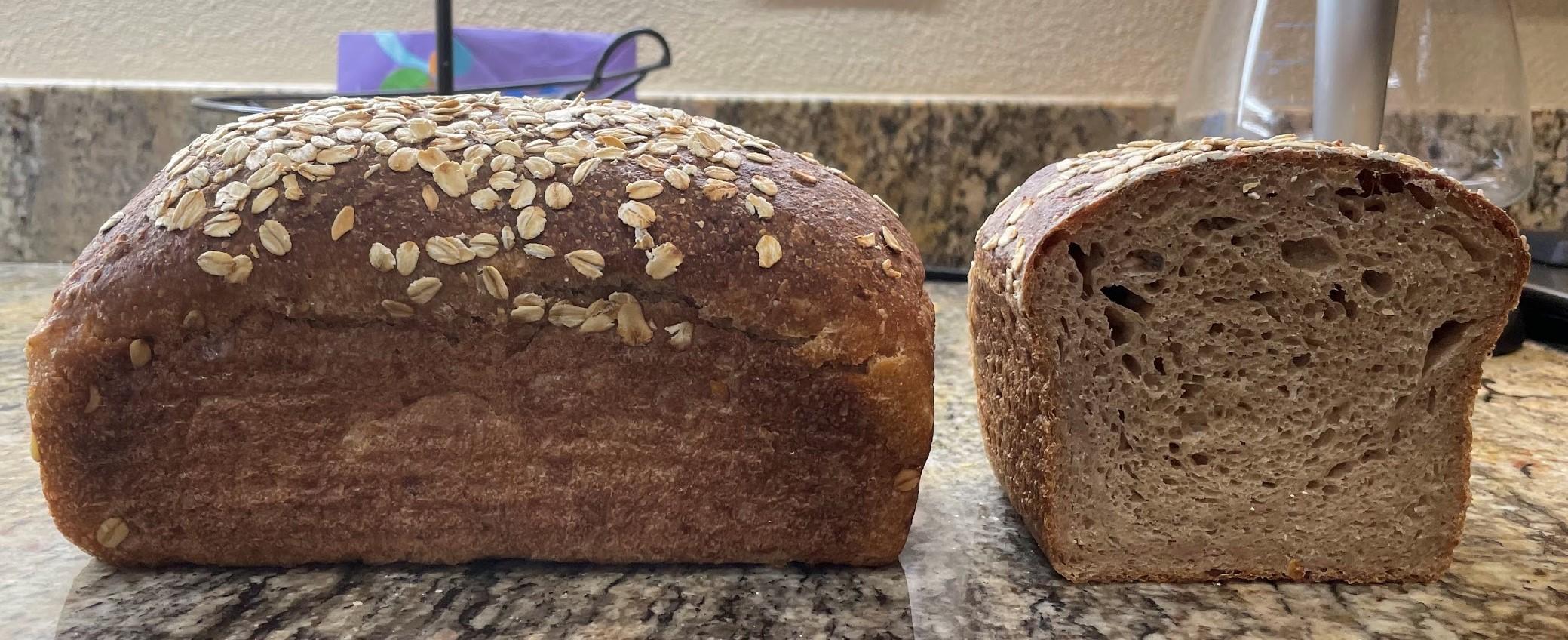Home › Forums › Baker Forums › Our Formulas › The Purist › Levain too dry?
- This topic has 15 replies, 5 voices, and was last updated 2 years, 10 months ago by Katherine Kehrli.
-
AuthorPosts
-
May 12, 2022 at 10:24 am #10899Katherine KehrliKeymaster
Jim,
Absolutely. Sorry for the delay. You may use your own starter in this formula, even if you maintain a rye starter, for example. Feel free to substitute and work the Purist to match your personal baking goals. Our intent with the current Purist is to optimize for a reduction of “sour” and it does a great job of that. However, there are multiple ways to a beautiful and delicious loaf.
Katherine
May 8, 2022 at 8:20 am #10756Paula vanHaagenParticipantDeborah, I just re-read your original post and saw you were trying to develop the levain by 4 pm. A warmer/daytime house is unlikely to be sufficient to expedite the levain development, it needs more starter. Hence the column in the formula titled “Quick Levain.” Were you using that?
May 8, 2022 at 8:14 am #10755Paula vanHaagenParticipantHi, Deborah, I’m replying to your original comment about your levain being too dry and slow to rise. Could you explain the “too dry” part? When mixed, the 74% hydration should not feel dry. It starts dry, like the autolyse, but when fully mixed, it is like dough. (The autolyse is a lot drier than the levain, 64% hydration.) If you can provide a photo, that would be helpful.
Regarding the slow development of the levain, that is an indicator that the starter is not active enough. Adding more water can expedite the fermentation a little but if you’re not getting a dome in 10-12 hours (overnight), then it needs investigating to understand why. Temperature matters a lot. Mine rises with an overnight temp of 58dF and 66 after 7am. If you’re confident your starter is plenty active, try increasing the amount of starter a few grams. Because of seasonal variation in our kitchens’ temperatures, it’s important to pay attention to the amount of starter you use and how long it takes to develop. (It’s great that you’re asking questions about this!) The formula is the starting point and your experience tells you when and how to vary. See the Tips under the Step-by-Step tab.
Paula
May 7, 2022 at 12:07 pm #10737Deborah BergParticipantAwesome! Thanks for the response and the openness to experimentation:)
Deb
May 7, 2022 at 11:08 am #10732Jim GlynnParticipantHi Katherine, I just saw your response to Deborah’s question. Are you saying that we can use our own levain in the Purist recipe?
I’d personally like a bit more sourdough flavor in the Purist loaves. I assumed that we were trying to keep the loaves as mild as possible, to appeal to a broad collection of tastes. If we have a bit more freedom, I’ll start experimenting!
Thanks,
Jim Glynn
May 7, 2022 at 8:18 am #10724Katherine KehrliKeymasterDeborah,
All comments you’ve received represent valuable input regarding the levain. I want you to know that you can use a looser levain if you choose. As Paula indicated there was a specific drive to reduce “sour” in the version of the Purist you have, however, this is a matter of personal preference. I didn’t mind or really notice the slight tang associated with our earlier versions of the Purist. But it is really valuable to note these differences and nuances. Do some experimentation yourself and be sure to enjoy one of the loaves. Do you notice a difference?
And good job using the forums! Have a great mother’s day and grandmother’s day!
Katherine
May 6, 2022 at 5:30 pm #10716Deborah BergParticipantI don’t know whether this will be seen, but am giving it a try. I didn’t get started with this new formula till a couple months ago so am still new at it. I, too, have noticed the slow, slow rate of the levain development, which is kind of making baking difficult. I can’t depend on it being ready after an overnight ferment. Today, I figured I could make levain in the morning and depend on my warmer daytime house to mix by 4:00 or so, then get it through its folds and put it in the fridge overnight and finish it tomorrow, eliminating the 1 and 2 A.M. bakes. But it’s not ready. So I don’t know how things are going to go.
I do know that that thick levain is not developing anything like my 100% hydrated starter sitting right next to it. It’s very dry. Could I change the ratio slightly to get a more manageable time frame? Hope to hear back. Thanks!
Deborah
December 15, 2021 at 12:30 pm #7706Paula vanHaagenParticipantThe stiff levain slows fermentation, which is helpful here. Before commercial yeast, some regions used stiff levain as their starter and kept it cool. Stiff starter is also easier to catch at its peak, which is important because the yeast have a big lift. We want as big a population as possible.
Our goal with this formula is to make sure the yeast and bacteria have enough food that we have the maximum population for the flour. When the population begins to run out of food, they die, we have less yeast available, and their byproducts of lactic and acetic acid cause the dough to become noticeably tangy. The levain will carry its load of acids and digested flour into the bulk dough. So we minimize the sour in the levain as well as the dough. In formula development tests, using more levain to achieve faster fermentation resulted in more sour, which is consistent with what I read in many sources. Formula testing drove the current %levain.
Regarding baking time, the dough determines the time it needs, based on its temperature. Warmer proofing is faster. The loaf increased in size during formula development, from total flour of 410g/loaf to 455g/loaf) and now takes longer to proof. I can’t explain why it slowed proofing since the %levain stayed the same. This has not affected the flavor because we have just enough levain.
December 13, 2021 at 1:29 pm #7628Estelle JohnsonParticipantJust made my first loaves with the new Purist formula. Can you explain how decreasing the hydration makes the sour flavoring less? This seem counter-intuitive.
Also, the final proof does take much longer and wonder if this adds to the increase in sour flavoring.
November 7, 2021 at 4:40 pm #6614Paula vanHaagenParticipantHi, I’m glad to hear the flavor was mild – that was the goal, to allow the wheat/honey/oat flavor outweigh the tang.
The levain formula is based on a room temp of 66dF, the typical cool PNW overnight kitchen. You could leave your levain on the counter or, if using the proofer, use 1g/loaf less starter “seed” when making the levain. Use your judgement to manipulate the variables so that the levain is just right when you’re ready to mix it into the autolyse.
I love my proofer too! I found that the new formula hits the shelf and top before the panned dough is fully proofed. I’m going to have to let it finish proofing on the counter while the oven finishes preheating. Not a problem for 2 loaves, only for 3 or 4, when I use the shelf.
November 6, 2021 at 9:20 pm #6590Jim GlynnParticipantHi Paula,
The bread turned out to be quite mild. The levain was much more active than I expected! I’m fortunate to have use of a proofer, which has been a game changer for me. It allows decent control of temperature which makes it easier to play with the other variables. Our house gets cold overnight, so I kept the levain in the proofer at 70 degrees and it really went to town!
I held the temperature between 75 and 80 for both bulk ferment and proofing. I think I’ll take your suggestion to let the loaves rest in the fridge overnight next time. That should give it a bit stronger flavor, which I prefer. Plus, I’ll get to sleep at a reasonable hour
November 6, 2021 at 4:17 pm #6574Paula vanHaagenParticipantHi, Jim, Your loaf looks good! How does it taste? Your starter looked very happy!
I also find the larger loaf to proof more slowly than when I tested it as a smaller loaf. Ambient temperature makes a difference. I’m finding it takes 4 hours when proofed at 75-78dF, and an hour longer when proofed at 66dF. You can retard in the fridge and finish proofing in the morning if that schedule works better for you.
November 6, 2021 at 10:57 am #6555Jim GlynnParticipantAs requested, here’s a picture from this week’s bake. Because of the reduced amount of levain, the process was quite slow. It probably should have proofed a little longer, but it was about 2 AM and I needed to get to bed. That said, I’m OK with how my first attempt at this formula turned out. I’m interested in what you think.
Jim Glynn
 November 5, 2021 at 9:48 am #6508Jim GlynnParticipant
November 5, 2021 at 9:48 am #6508Jim GlynnParticipantThanks for your reply. I went back and read the fine print on the instructions, and they mention that the levain is about 75% hydration, so I guess I should have expected it to be dryer than I’m used to.
It also expands significantly more than I expected. Note to self, use a larger container next time!
November 5, 2021 at 7:54 am #6504Katherine KehrliKeymasterRight? I know from experience it would be easy to transpose. The levain for the Purist is not a 100% liquid levain it is a little “stiffer”. This is intentional to the process of reducing the tartness.
Wishing you success on your baking day! Thank you for your dedication.
Love to see a picture of your loaves when they are all finised.
-
AuthorPosts
- You must be logged in to reply to this topic.


